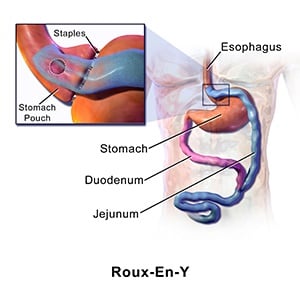
"One of the most important things to take away is that there is durability of remission over time," said Dr. Anita Courcoulas of the University of Pittsburgh Medical Center, who led the research in a study titled Bariatric Surgery vs Lifestyle Intervention for Type 2 Diabetes Mellitus.
Past studies have found that weight loss surgeries sometimes result in improvement for people with type 2 diabetes, but it remains to be seen if the surgeries are better at treating the condition than lifestyle interventions, the researchers write in JAMA Surgery.
And few studies have examined the effectiveness of weight loss surgery for people with diabetes as well as class 1 or 2 obesity, which represents a body mass index (BMI) between 30 and 39. (BMI is a measure of weight in relation to height).
Test yourself: What's my BMI?
Weight loss surgeries are typically used to treat people with a BMI of 40 or more, or with a lower BMI but other health conditions.
Three-and-a-half million South Africans (about 6% of the population) suffer from diabetes and there are many more who are undiagnosed. It is estimated that another five million South Africans have
pre-diabetes, a condition where insulin resistance causes blood glucose levels to be higher than normal, but not high enough yet to be type 2 diabetes.
The highest prevalence of diabetes is among the Indian population in South Africa (11-13%) as this group has a strong genetic predisposition for diabetes. This is followed by 8-10% in the coloured community, 5-8% among blacks and 4% among whites.
Type 2 diabetes, the most common form, is often linked to obesity. In type 2 diabetes, the body doesn't make enough of the hormone insulin, which helps cells use glucose for fuel, or enough insulin is produced but cells are resistant to it.
Read: Understand insulin resistance
For the new research, the researchers studied 61 people, ages 25 to 55, with type 2 diabetes. About half had class 1 obesity and the rest were heavier.
Participants were randomly assigned to receive one of three treatments.
1: An intensive lifestyle intervention for one year to help them lose weight with diet, exercise and behaviour changes,
2: followed by a lower-intensity lifestyle intervention involving behavioural counselling a few times a month for two years.
3: alternatively, participants were assigned to one of two weight loss surgeries: either Roux-en-Y gastric bypass (RYGB), or laparoscopic adjustable gastric banding (LAGB). The surgeries were followed by the same low-intensity lifestyle intervention the non-surgery group got, for two years.
Read: The difference between a bypass and gastric band
After three years, 40 percent in the RYGB group, 29 percent in the LAGB group and no one in the lifestyle intervention group had at least a partial remission of their type 2 diabetes.
Three people in the RYGB group and one person in the LAGB group had their diabetes disappear entirely, which did not occur for anyone in the lifestyle group.
Researchers also found that blood sugar control improved more in the surgery groups, compared to the lifestyle intervention group. The surgery groups were also more likely to no longer need medication for their diabetes.
While the new results are a from a randomized study, which is considered the "gold standard" of medical research, Courcoulas said they will need to follow more patients at several medical centers over a longer period of time to draw definite conclusions.
The researchers are pooling their data with similar studies from across the country, she added.
"We'll be able to see what the remissions look like at five and seven years," Courcoulas said. "I think that's the next step in this field."
Dr. Osama Hamdy, who was not involved with the new study, cautioned that people with type 2 diabetes and their doctors should not get overly excited about the results.
"Any study like this we need to be very cautious when reading them and read between the lines," said Hamdy, who is medical director of the Joslin Diabetes Center Obesity Clinical Program.
For example, Hamdy pointed out, only a handful of people in the surgery groups had their diabetes disappear. What's more, he said, newer lifestyle-only interventions can be very effective.
"I'm cautious about this and people have to weigh the risks and benefits," he said.
Obesity: is surgery an option?
Obesity surgery can be fatal
How to make lifestyle changes if you have diabetes




 Publications
Publications
 Partners
Partners











